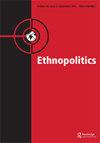The Challenges of Nation-Building in Nigeria and the State-Building Alternative
IF 1.2
Q3 ETHNIC STUDIES
引用次数: 0
Abstract
ABSTRACT Nigeria’s current democratic dispensation is plagued by a rise in ethnic nationalism, agitations for self-determination and secession, claims of marginalisation, and ethnic, regional and religious tensions. These issues continually dominate state politics. For some analysts, these problems are symptoms of a lack of oneness among the multiple ethno-linguistic and religious groups that make up the country. They are of the view that the solution to the intractable problems lies in nation-building, suggesting the enthronement of a sense of common nationality. On the contrary, this article argues that the lack of national consciousness for a nation may not be the main problem but the lack of viable institutions that can promote deep inter-ethnic relations. State-(re)building in the form of institution-strengthening is rather important for unity in the plural society. Therefore, the creation of new institutions and the strengthening of existing ones, including the federal system, to produce a viable Nigerian state capable of delivering on public goods and good governance is more important to address the many challenges confronting the state.尼日利亚国家建设的挑战和国家建设的选择
本文章由计算机程序翻译,如有差异,请以英文原文为准。
求助全文
约1分钟内获得全文
求助全文

 求助内容:
求助内容: 应助结果提醒方式:
应助结果提醒方式:


